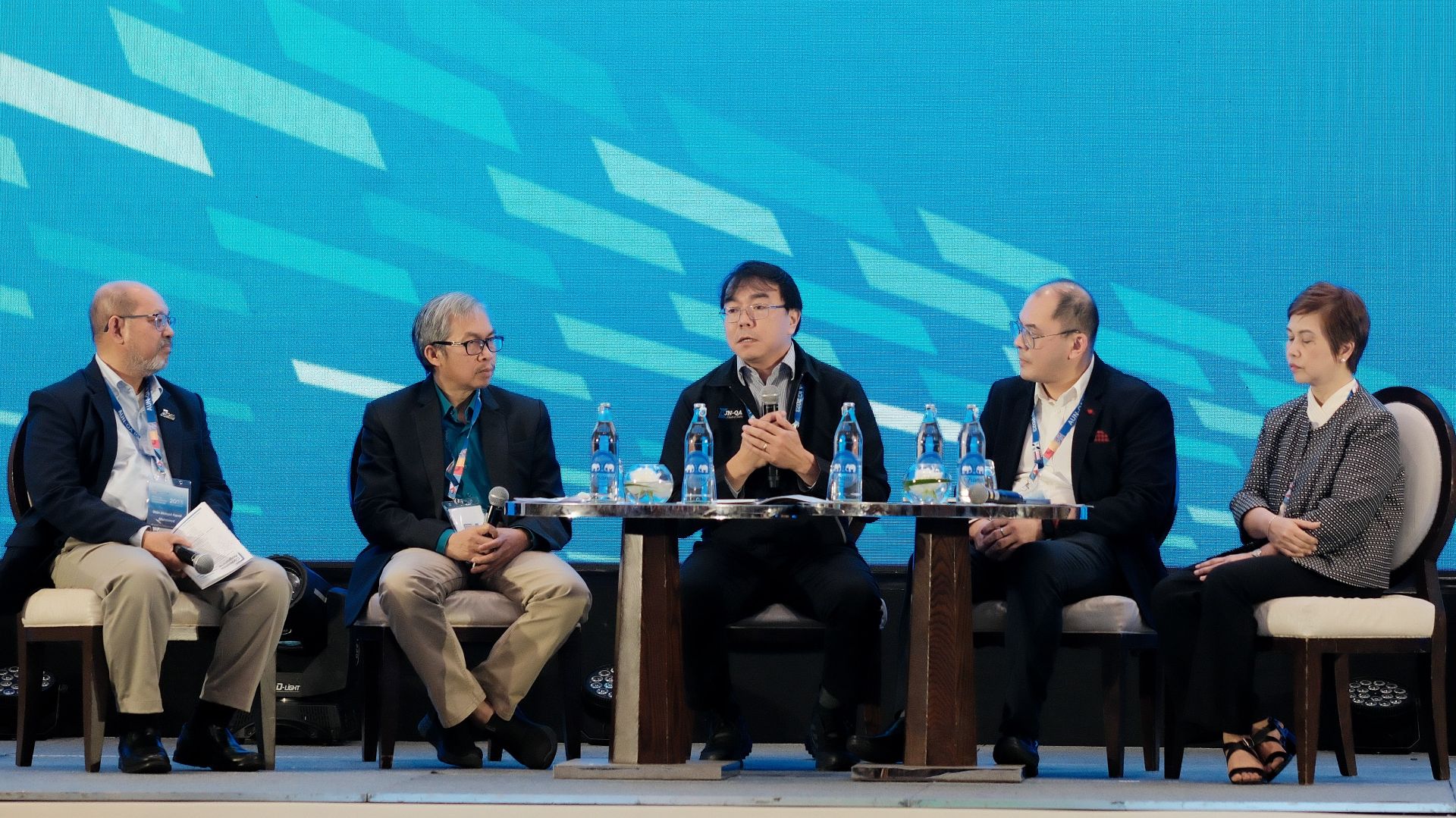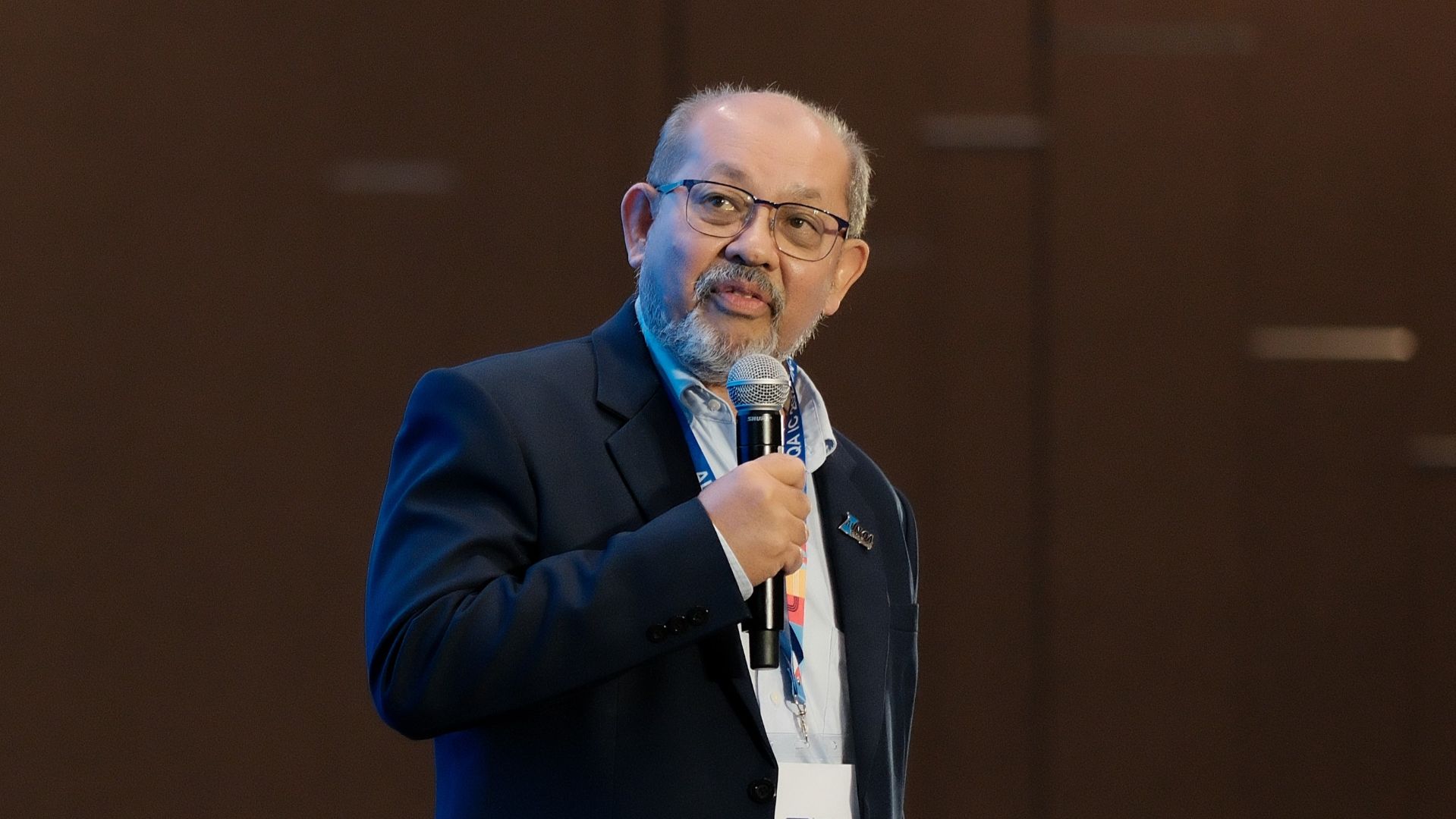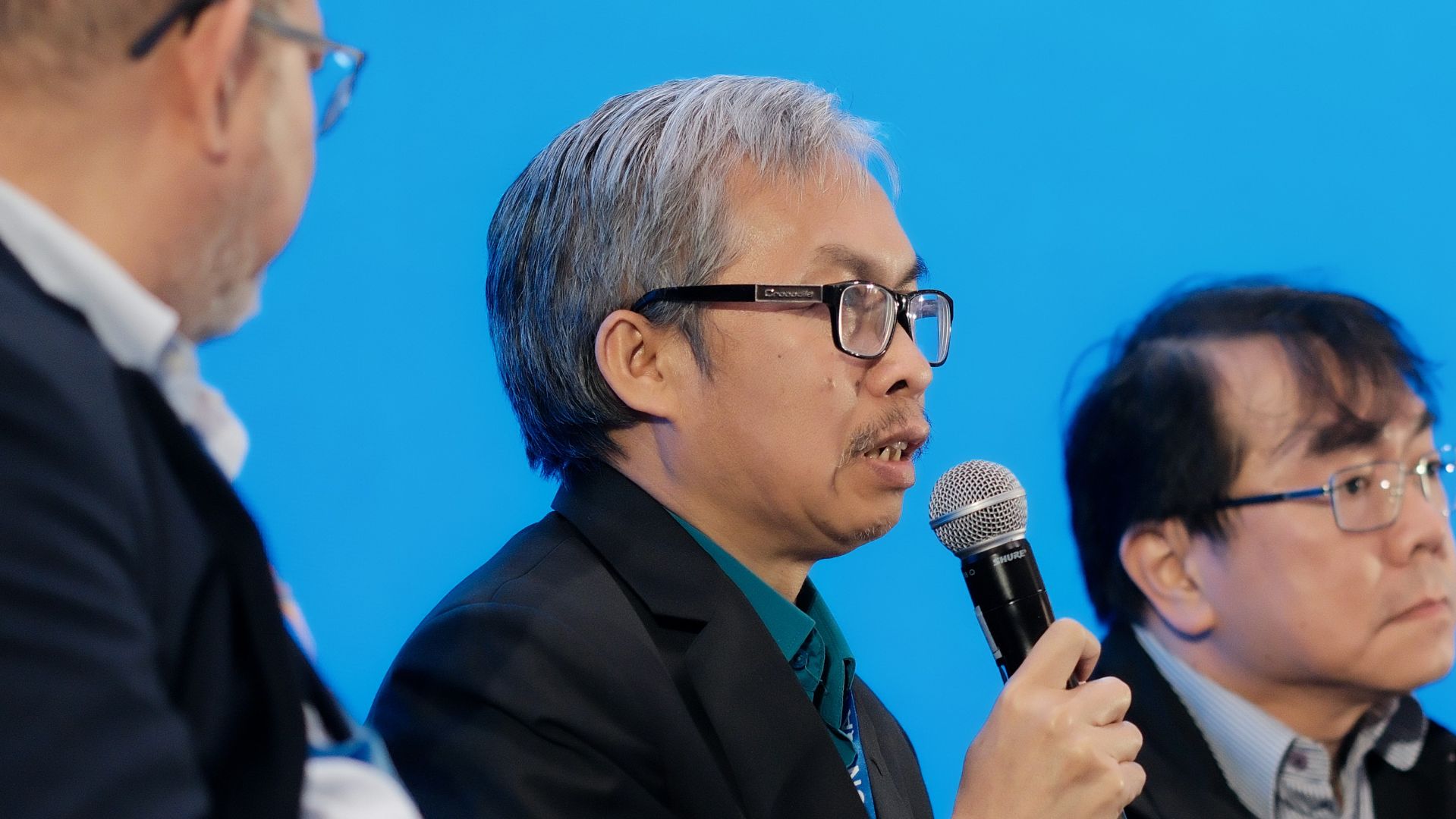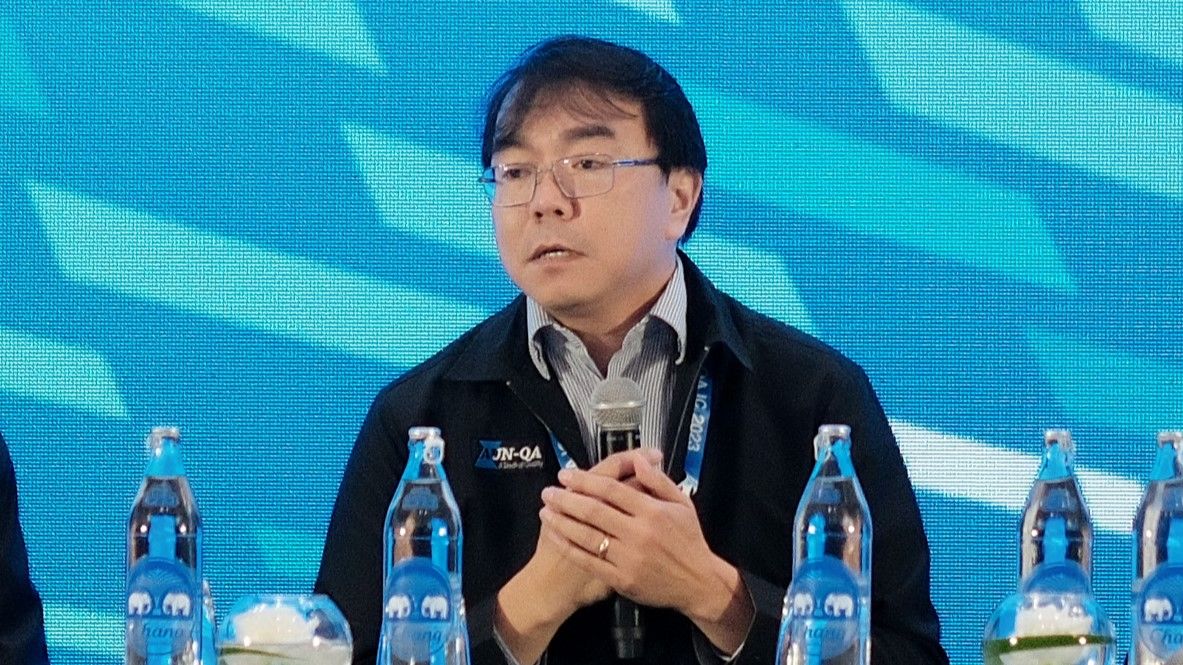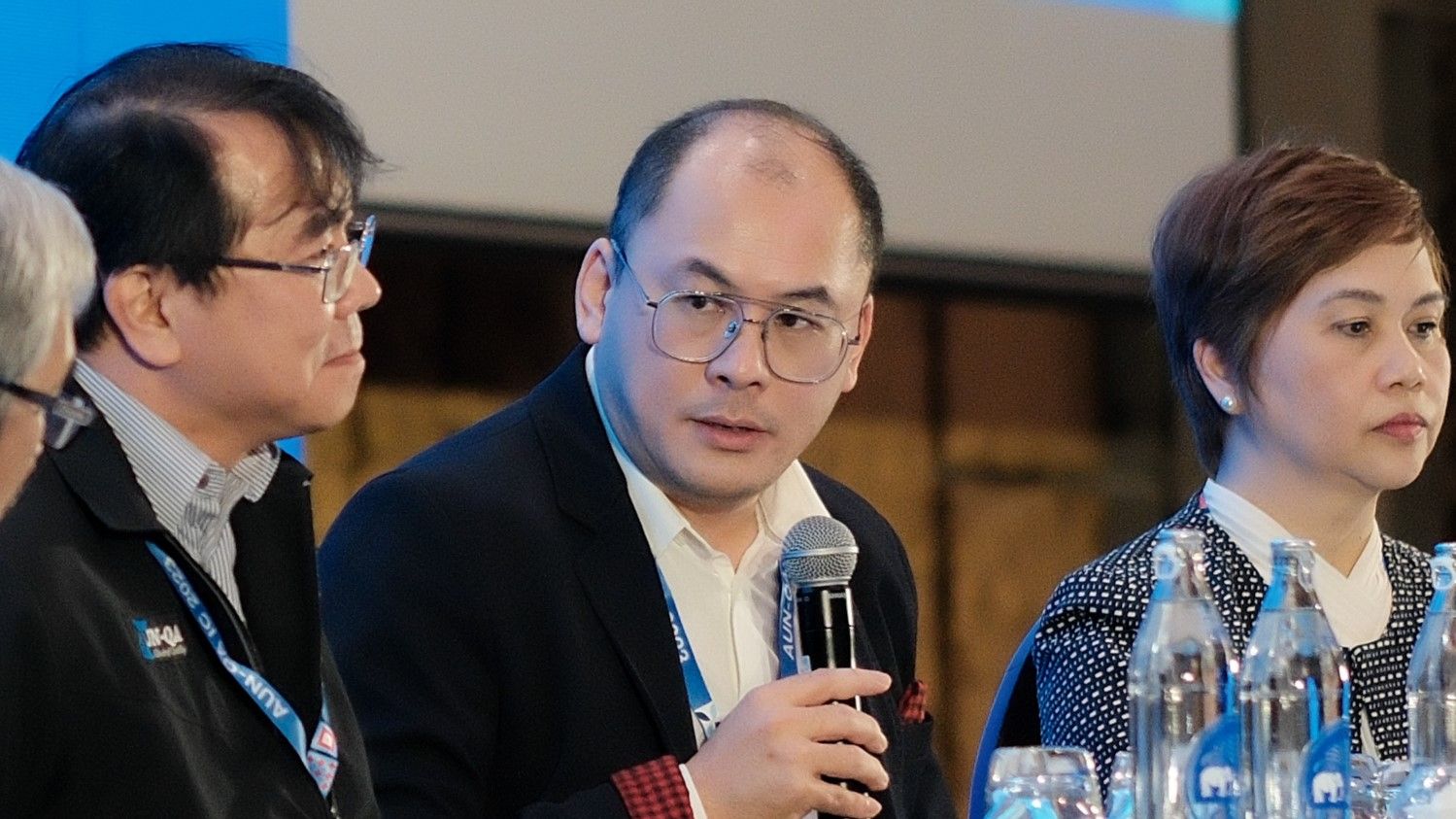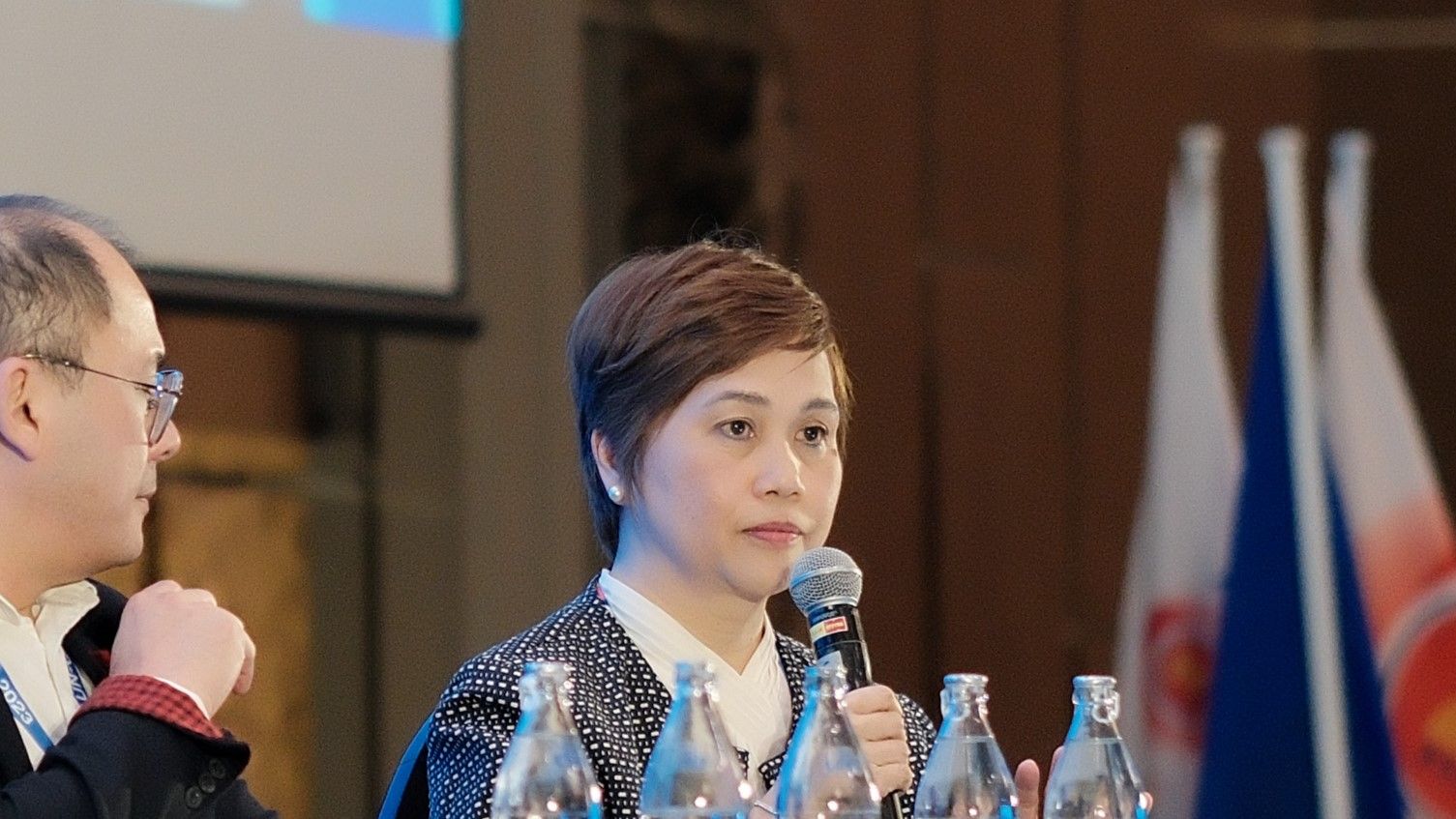- Home
- Discover AUN
- AUN in Action
- News
- ASEAN+3 UNet Rectors to sharpen the edge for their graduates to compete on the global labor market
- Introducing the AUN Thematic Network Series #16 - AUN-ADERA
- University of Deusto trains ASEAN educators on how to set up online learning
- 2021 Essay Competition for Undergraduate Students on Critical Human Rights and Peace Issues in ASEAN/Southeast Asia
- International experts on sustainable city development convene at 2nd CAIC-SIUD 2021
- Japan-ASEAN Training Course towards SDGs "Learning Japanese culture and Biodiversity from UNESCO Biosphere Reserves in Japan"
- Coming Next Week: AUN-QA Assessors’ Meeting 2020 (Online)
- Launch of Online Course on Human Rights in Southeast Asia
- Recap: Remote AUN-QA Assessment Task Force Meeting
- AUN-QA Overview: 240th-243rd AUN-QA Programme Assessments
- Introducing the AUN Thematic Network Series #0 - What are the Thematic Networks?
- Introducing the AUN Thematic Network Series #1 - AUN-QA
- Introducing the AUN Thematic Network Series #2 - AUN-BE
- Introducing the AUN Thematic Network Series #3 - AUN/SEED-Net
- Introducing the AUN Thematic Network Series #4 - AUNILO
- Introducing the AUN Thematic Network Series #5 - AUN-ACTS
- Introducing the AUN Thematic Network Series #6 – AUN-HRE
- Introducing the AUN Thematic Network Series #7 – AUN-USR&S
- Introducing the AUN Thematic Network Series #8 – AUN-HPN
- Introducing the AUN Thematic Network Series #9 – AUN-AEC
- Introducing the AUN Thematic Network Series #10 – AUN-SAN
- Introducing the AUN Thematic Network Series #11 – AUN-DPPnet
- Introducing the AUN Thematic Network Series #12 – AUN-CA
- Introducing the AUN Thematic Network Series #13 – AUN-SCUD
- Introducing the AUN Thematic Network Series #14 – AUN-UIE
- Introducing the AUN Thematic Network Series #15 – AUN-EEC
- Introducing the AUN Thematic Network Series #17 – AUN-TEPL
- Dr. Pekka Leviäkangas speaks on Intelligent Transportation System (ITS) in Smart Cities at the 2nd CAIC-SIUD
- Redefining enriched virtual mode of instruction amidst the COVID-19 Pandemic: The UST Experience
- Introducing the AUN Thematic Network Series #18: Recap Summary
- VNU Hanoi launches The Vocational and Higher Education Quality Hub
- AUN-QA Overview: 210th, 217th, 209th AUN-QA Programme Assessments
- ASEAN Universities Collaboration on Pandemic Related Issues
- CAIC-SIUD 2021: Keynote Address by Dr. Mohammed Ali Berawi on Smart Infrastructure and Digital Twin
- Blended local QA and UPM assessments in Vietnam
- AUN-QA Overview: 247th and 248th AUN-QA Programme Assessments
- AUN-EEC: Going in Circles? Learning From Feedback Loops
- Representatives from Brunei Darussalam win the ASEAN-Korea Good AKtion Challenge
- Mapúa University notes AUN-QA’s unique and thorough approach that goes beyond their expectations
- MU, UM, and SMU hosts the 2nd AUN-TEPL Symposium
- “Explore, Exchange, Experience!” UKM’s Virtual Global Café: International Food Culture 2021
- CAIC-SIUD 2021: Keynote Address by Dr. Svetlana Gutman and Dr. Elena Rytova on Smart City Indicators
- “Ensuring Quality during Challenging Times” – A SHARE-NUS Seminar
- AUN-QA Overview: 233th, 250th, 251st & 252nd AUN-QA Programme Assessments
- Insights on the importance of university associations in internationalization shared at UKM Global Webinar Series #4
- Promotional Video - Japan-ASEAN Training Course towards SDGs “Learning Japanese culture and Biodiversity from UNESCO Biosphere Reserves in Japan"
- ASEAN thought leaders weigh in on how we can build a better, human-centric workplace
- AUN-QA Overview: 234th AUN-QA Programme Assessment
- Dr. Choltis Dhirathiti on SHARE Policy Dialogue 13: Contribution of Internationalization to Graduate Employability
- The ASEAN-China Youth Summit: Celebrating 30 Years of ASEAN-China Dialogue Relations
- Students discuss success factors in formulating global partnerships in Teen-Talk Project Series 6
- SPRAC: Special Program for Research against COVID-19
- AUN-QA Overview: 253rd, 254th & 255th AUN-QA Programme Assessments
- Kick Off Day For “Healthy Mahidol in New Normal” sets the tone for more health-conscious institutions
- FEU students reflect on ECAAR Dialogues on the "Ethics of the ASEAN Human-centric workplace"
- AUN-QA Tier-1 Training Returns
- AUN-QA Overview: 256th & 257th AUN-QA Programme Assessments
- Emergence of the Hybrid World: Its Imperatives and Challenges
- Participants share their experiences in AUN-QA Tier 1 Training (Online)
- AUN-QA Overview: 246th & 258th AUN-QA Programme Assessments
- The AUN Executive Director's Keynote Speech at USTMAM Encourages the Importance of Regional Cooperation for the Development of ASEAN Region
- AUN-QA Special: Opening Door to the Future of Higher Education at NUOL
- Mainstreaming interdisciplinarity: a commentary
- The First Online AUN-QA Assessors' Meeting
- AUN-QA Overview: 259th, 260th & 261st AUN-QA Programme Assessments
- Complementarity, Continuity and Competitiveness — Championing the 3 ‘C’s of Higher Education in the ‘New Normal’
- AUN-QA Council exploring new frontiers
- First AUN-CA Online Board Meeting signals beginning of online arts and culture activities
- New AUN-QA Guidebook approved by AUN-QA Council Members
- AUN-QA Overview: 262nd AUN-QA Programme Assessment
- Sunrise on virtual cultural exchange as ASEAN-Japan student programme concludes
- 10th IRO+3 Meeting concludes with strong push for more connectivity and student involvement within the network
- New AUN-QA Guidebook approved by AUN-QA Council Members
- Corona Blues and Managing Happiness
- Corona Blues: Symptoms and Treatments
- AUN ACTS steers student mobility through the pandemic
- AUN-QA welcomes 10 new associate members
- A quick chat with the last pre-corona AUN intern
- AUN-QA Emblem design philosophy explained
- QA experts discuss quality assurance for online and distance learning in SHARE webinar
- Transitioning to Virtual Exchange Programs in the Post-Corona Sphere
- Adapting to the New Normal: AUN-QA Programme Assessment
- Recap: AUN-TEPL webinar series #4
- Intern Sharing - On being virtual and contributing to an ongoing crisis
- The ‘New Normal’ in the Aviation Industry
- AUSN Mental Health Webinar engages ASEAN youth with healthy practices to combat mental health issues in the pandemic
- Setting direction and exploring collaborations, AUN-EEC members meet at the 2nd AUN-EEC General Assembly (online)
- Architecture experts stress importance of Modern Heritage Conservation in AUN-ADERA Inaugural Meeting and Symposium
- Unveiling the Brand New “University Performance Metrics” System at Vietnam National University, Hanoi
- Introduction to AUN-QA Series #1 - Membership
- Educators around the world discuss the future of MOOCs at the 11th TCU International e-Learning Conference 2020
- AUN-QA Assessors: ‘We Are Ready’
- ASEAN Universities remain vigilant about education quality during COVID by preparing for a new method of assessment
- ASEAN and Australian Perspectives on Quality Assurance in Online Learning for the Higher Education Sector
- Ambassador of Norway to ASEAN meets scholarship recipients of the ASEAN Master Program in Sustainability Management in Yogyakarta
- AUN-QA Overview: 264th, 265th & 266th AUN-QA Programme Assessments
- Mahidol University presents Healthy University Day through revolutionary “Metaverse” exhibition
- Mental Health Struggles and Experiences: How do ASEAN university students cope in the virtual setting?
- AUN-QA Overview: 267th & 268th AUN-QA Programme Assessments
- ASEAN Nobel Laureates and Thought Leaders discuss the promise of freedom and the challenge it faces in an age where information is powered by social media
- AUN-QA Overview: 269th & 271st AUN-QA Programme Assessments
- AUN ED presented challenges and opportunities in a state of disruption towards higher education to ASEAN delegates for Y20 Summit 2022
- In the name of Democracy: Southeast Asia's struggle on freedom and ethics
- Introducing the use of Citizen Science to reach the UN SDGs in Southeast Asia at the AUN-EEC Workshop
- AUSN student leaders convened to summarise their achievements in AUSN Annual Meeting 2/2021
- AUN-QA Revision Committee engaged in the first AUN-QA physical meeting held since the pandemic as Institution Assessment is set to return to action
- CALOHEA Project reports its progress at the 4th General Meeting
- AUN-QA Overview: 273rd, 274th & 275th AUN-QA Programme Assessments
- AUN-QA and MyQAN connect in promoting Higher Education quality assurance in Malaysia
- New AUN-QA Associate Member Introduction: University of Transport and Communications
- AUN-AYCF Thailand Celebrates its 4th Anniversary
- AUN-CA updated its advancement on the 7th AUN-CA Annual Meeting
- AUN Executive Director delivered his remarks on Governance on Higher Education at WHEC 2022
- AUN-QA Overview: 272nd, 276th, 249th & 263rd AUN-QA Programme Assessments
- Atty. Punzalan’s keynote highlights outlook and strategies for recovery of creative industries in the ASEAN region at the 7th AUN-CA Annual Meeting
- GUAF released first press statement promoting international exchange and collaboration in higher education
- AUN Team visits INQAAHE Secretariat in Barcelona, Spain
- ASEAN University Network Executive Director’s Remarks at the Asia Universities Summit 2022
- AUN-QA Courtesy Visit to Indonesia: A milestone in the return of on-site activities
- AUN-QA Overview: 213th, 277th, 278th & 279th AUN-QA Programme Assessments
- AUN-QA Courtesy Visit to Indonesia Series #1: Universitas Gadjah Mada
- ASEAN Master in Sustainability Management Series #1: AUN Applauds the Collaborative Success of the unique ASEAN Master Degree Programme
- Dr. Choltis shared his views on credit transfer systems at the HAQAA2 African Credit Transfer System Re-Launch Workshop
- AUN Executive Director delivered his remark on the role of alumni network in the future of Higher Education at SHARE ASEAN-EU Exchange Students and Alumni Summit
- Universiti Malaya, Singapore Management University and Mahidol University hosted the 3rd ASEAN University Network-Technology-Enhanced Personalised Learning Symposium (Online)
- AUN-QA Courtesy Visit to Indonesia Series #2: UBAYA
- AUN-QA Overview: 270th, 280th & 281st Programme Assessments
- Announcing ASEAN Representatives for 2022 ASEAN-Korea Youth Summit!
- ASEAN Master in Sustainability Management Series #2: Insightful Perspectives of the Talented Students in this Programme
- AUN-QA Courtesy Visit to Indonesia Series #3: Universitas Muhammadiyah Malang
- ASEAN Master in Sustainability Management Series #3: Continuing the dialogue with the scholarship awardees of this programme
- CALOHEA Project established the Dissemination Board, and launched its first meeting
- AUN-QA Overview: 245th, 282nd & 283rd AUN-QA Programme Assessments
- New AUN-QA Associate Member Introduction: Cagayan State University
- AUN and SUN/SixERS MOU Signage Renewal
- Academic librarians from the AUNILO Members gathered to discuss the improvement toward being a User-Centric Libraries
- LPU-B President’s Remark on Quality Assurance at 284th AUN-QA Programme Assessment
- ASEAN Master in Sustainability Management Series #4: Behind the Immense Success of the ASEAN Master in Sustainability Management
- AUN-QA Overview: 284th & 285th AUN-QA Programme Assessments
- AUN-QA’s meetings with stakeholders: Exploring current QA prospects in Viet Nam
- Dr. Choltis Dhirathiti’s remarks at SHARE Policy Dialogue 15 on ASEAN Higher Education Space 2025: The timing is right
- 2nd AUN-HPN HURS Workshop Continues in Strengthening Health Promotion Capabilities of Universities
- AUN-QA’s Official Meetings in Viet Nam Series #1: Ministry of Education and Training
- AUN-QA congratulates 7 newly appointed AUN-QA Lead Assessors
- Youth Leaders and Advocates from ASEAN and ROK Convened at ASEAN-Korea Youth Summit 2022 for Carbon Neutrality and Regional Cooperation
- AUN-QA Overview: 286th, 287th, 288th, & 289th AUN-QA Programme Assessments
- Video documenting the ASEAN Master in Sustainability Management’s success released today!
- Welcome New Members to our AUN-QA Family!
- Opinion upon ASEAN-Korea Youth Summit 2022: Fostering Youth Cooperation in Achieving Carbon Neutrality
- AUN-QA’s Official Meetings in Viet Nam Series #2: Accreditation Centers and Rating System
- On-Site/Remote AUN-QA Council Meeting 2022
- AUN-QA’s Official Meetings in Viet Nam Series #3: Quality Assurance Units
- Launch of ASEAN-India Network of Universities (AINU)
- AUN-QA Overview: 290th, 291st AUN-QA Programme Assessments
- Introducing ASEAN Engineering Journal (AEJ) by JICA Project for AUN/SEED-Net
- AUN-QA’s Official Meetings in Viet Nam Series #4: Member Universities
- 2022 APEC Youth Voices Matter Speaking Contest: Open, Connect, and Balance at Mahidol University
- 7th ECAAR Dialogues Webinar: ASEAN Master Students and Thought Leaders convened to discuss the value of biodiversity in the ASEAN region and how sustainable business practices can be adapted to benefit both ecosystem and workforce
- AUN-QA Overview: 292nd, 293rd, 294th AUN-QA Programme Assessments
- AUN Recap: The 2nd Focus Group Meeting of AUN/SEED-Net Transitional Plan
- 3rd AUN-AYCF Thailand at Burapha University: Pioneering the Expansion of Shared ASEAN Culture
- AUN-EEC Conference 2022 “Ecological Education and Culture: Looking Back, Looking Forward”
- Commitment and Passion: The Story Behind the 3rd AYCF Thailand at Burapha University
- The Ethics of Environmental Sustainability in the Era of Climate Crisis
- 13th AUN Rectors’ Meeting and 37th AUN-BOT Meeting successfully held in Vientiane, Lao PDR
- Delegates from the ASEAN Member States and ROK Gathered at ASEAN-Korea Youth Summit 2022 Closing and Awarding Ceremony
- AUN-DPPnet Launching TILE Project’s New Guidebook for Fostering Disability-Friendly Learning Environment
- AUN-QA Overview: 295th and 296th AUN-QA Programme Assessments
- The 13th AUN Rectors’ Meeting at Lao PDR
- AUN-QA Overview: 297th, 298th, and 299th AUN-QA Programme Assessments
- AUN-QA Marking Another Milestone: Being Accepted as the New Full Member of INQAAHE
- The 37th ASEAN University Network Board of Trustees Meeting
- The 12th ASED Meeting, 6th ASEAN+3 EMM, 6th EAS EMM and related Senior Officials Meetings on Education at Hanoi, Viet Nam
- 9th AUN-QA Training Course for Accomplishing Programme Assessment: The Return of Onsite Training
- 37th AUN-BOT Meeting: ASEAN-India Cooperation Strengthens through Scholarship Schemes
- Mahidol University Celebrating 10 Years Anniversary of IHRP: Seminar on Human Rights and Peace Education
- Introducing The Asian Network: The Community of Leaders in Asia
- Researchers and Experts from the UK and ASEAN +3 Gathered at UK-SEA PEER Concluding Hybrid Conference
- Japan-ASEAN Online Program Toward SDGs, opening up the new era of multilateral collaboration by Okayama University, SUN/SixERS, and AUN
- Spotlight of Agendas Presented in the 17th SOM-ED and 12th SOM-ED+3 Meeting
- 37th AUN-BOT Meeting: EURAXESS Supports Researchers Worldwide
- Inspiring Experiences Captured from the First Onsite Training Course for Accomplishing Programme Assessment, Version 4.0 (Batch 9)
- The Story of “Continued Improvement”: AUN-QA Aiming For the Delivery of the Best Training Experience
- The First Agenda from the 13th AUN Rectors’ Meeting: Driving University Excellence through Regional and International Cooperation
- The First ASEAN Cooperation Forum on Management of Non-Traditional Security Discussing Challenges and New Strategies For ASEAN Security Management
- AUN-QA Overview: 301st and 302nd AUN-QA Programme Assessments
- 13th AUN Rectors’ Meeting: AUN-TEPL Drives University Talents through Personalised Learning Technology
- Brunei’s Daily Newspapers featured the success of AUN-QA Tier 1 Training
- Special AUN-QA Feature: The 303rd AUN-QA Programme Assessment, Returning of Site Visits Starting at Mahidol University
- 10th AUN-QA Training Course for Accomplishing Programme Assessment Continues its Onsite Operation!
- Top Two Universities of the ASEAN Region Took Part in the 303rd and 304th AUN-QA Programme Assessments
- 13th AUN Rectors’ Meeting: AUNILO Promoting Fast and Detailed Information Sharing Among AUN Member Universities
- Special AUN-QA Feature: The Continuation of Site Visits in the 305th Programme Assessments at Ho Chi Minh City University of Technology and Education
- The first ever joint ASEAN Regional Consultation on Digital Transformation of Higher Education by UNESCO-ICHEI & AUN
- 13th AUN Rectors’ Meeting: UI GreenMetrics, The Ranking System that Propels University Healthiness and Sustainability with Competition and Cooperation
- Strengthening ASEAN Universities’ IQA For the Years Ahead: Training on Internal Quality Assurance (TrainIQA) Workshop 1 in Bangkok 2022
- Ministry of Education, Brunei Darussalam's Aspects on the AUN-QA Tier 1 Training
- AUN-QA Overview: The 305th and 307th AUN-QA Programme Assessments Conducted at Two Prestigious Universities of Viet Nam
- 13th AUN Rectors’ Meeting: The Healthy University Rating System, A Road Towards Health Promoting Universities
- Cross-Cultural Transmission in Motion: ASEAN-Japan Virtual Cultural Exchange Programme 2022 (AUN-SUN/SixERS Cross-Cultural Event) Ends on a Successful Note
- AUN-UIE Held its Annual Meeting 2022
- Special AUN-QA Feature: AUN-QA Conducts More Site Visits for the 308th Programme Assessment at the Philippines’ Top University, Ateneo de Manila University
- Open Up New Opportunities for AUN Universities with Australia in 2023
- The first AUN-UIE Webinar 2022 exploring ways to foster innovative thinking and entrepreneurship in ASEAN Higher Education Institutes
- 13th AUN Rectors' Meeting: ASEAN Master in Sustainability Management Drives Exceptional Study Programme and Mobility
- AUN-QA Overview: Concluding 2022 With 4 More Programme Assessments
- Introducing NEAS Australia: The Global Leader in Quality Assurance for the English Language Teaching Community
- SUN/SixERS Cross-Cultural Event: Cultural Dialogue ventures on the profound parallel between Buddhism and One Piece
- AUN Driving Universities towards Excellence as the Next Chair of GUAF in 2023
- 11th AUN-QA Tier 1 Training: The Fine-tuning of Onsite Operation Concluded The Year 2022
- Special AUN-QA Feature: The AUN Executive Director Announces Line-up for 2023 at the 311th AUN-QA PA at Ton Duc Thang University
- The Signing Ceremony of Cooperative Framework of AUN/SEED-Net Transitional Period
- 13th AUN Rectors’ Meeting: Hideki Shimazu Highlights AUN/SEED-Net’s Successful Collaborative Education Program
- Virtual MoU Signing Ceremony between NEAS Australia and AUN
- The Second Agenda from the 13th AUN Rectors’ Meeting: Interdisciplinary and the Future of ASEAN Higher Education
- ASEAN Universities Shared Health Promotion Progress and Success Stories at the 7th AUN-HPN International Advisory Committee Meeting
- 3rd AUN International Health Promotion Conference highlighted actions towards Mental Health Issues and Well-being in ASEAN Universities
- 8th ECAAR Dialogue Webinar: “Ethics of Work and Human Development” Experts Gathered to Discuss What Future ASEAN Workplaces Should Look Like
- 13th AUN Rectors’ Meeting: Singapore Management University’s Approaches towards Interdisciplinary Education and Research
- The Making of the First Ever International Master in Human Development in the ASEAN Region
- 13th AUN Rectors’ Meeting: Four Unique Interdisciplinary Approaches through Universiti Malaya’s Lens
- The AUN Executive Director Delivered an Opening Remark at the ASEAN-QA Forum 2023: Myanmar Chapter
- The MOU Signing Ceremonies from the 3rd AUN International Health Promotion Conference
- AUN-QA Overview: Beginning 2023 with 3 Programme Assessments in the Philippines and Malaysia
- Special AUN-QA Feature: Universiti Teknologi Malaysia Strides towards the Better Quality Assurance on the 315th AUN-QA Programme Assessment
- 13th AUN Rectors’ Meeting: How Chulalongkorn University is Evolving with the Future of ASEAN Higher Education Heading Towards Interdisciplinarity
- The Third Agenda from the 13th AUN Rectors’ Meeting: Data Strategies and the Achievements of High-Impact University Missions
- China-ASEAN University (Country and Regional Studies) Think-Tank Network: Partner Toward Shared Future
- 13th AUN Rectors’ Meeting: High Impact Achievements and the Four Data Strategies of Universiti Sains Malaysia
- AUN-QA Overview: Two Leading Institutes of Thailand Welcomed AUN-QA for the 317th and 319th Programme Assessments
- 13th AUN Rectors’ Meeting: The Developed Data Strategies by Viet Nam National University, Hanoi through the Implementation of a Quality Assurance Portal
- 13th AUN Rectors’ Meeting: Data, a Powerful Enabler of Research and Innovation, and the Data Infrastructure of NUS
- AUN-QA Overview: An Exciting Return to Vietnam as AUN-QA Visited Lac Hong University and Hanoi University of Public Health for the 320th and the 321st Programme Assessment
- The Astounding Success of The First CALOHEA National Meeting at Institut Teknologi Sepuluh Nopember
- Announcement: AUN/SEED-Net Website will be Merging with the AUN Secretariat Website
- NEAS Australia Sparks Interest Among ASEAN Universities: Promoting Educational Excellence of English Language Teaching Community
- The 12th Assessor Training Workshop for AUN-QA Programme Assessment and the 244th AUN-QA Programme Assessment at De La Salle University, the Philippines
- Professionals, Students, and Academics Gathered to Share and Reflect on the Local Context for the 3RMs Development at the 2nd CALOHEA National Meeting at Chulalongkorn University
- AUN-QA Overview: Marching on with the 322nd, 323rd, & 313th AUN-QA Programme Assessments
- A Breakthrough on Digital Transformation for ASEAN HEI’s: Workshop on Quality Standardization in University’s ICT System and Management
- Explore Singapore’s Vision of Future City with ASEAN Experiential Learning Programme (AELP) 2023
- Preparing for any Emergencies: AUN Secretariat Equips Staff with Life-Saving Skills to Protect Student Safety
- Special AUN-QA Feature: Partners Reunited on Path towards Excellence as the University of the Immaculate Conception Welcomed AUN-QA for the 323rd Programme Assessment
- Unlocking Digital Transformation in ASEAN Universities: Lessons from the Workshop on Quality Standardization in University's ICT System and Management
- Madayaw Davao!: New Relationships Forged and Partnerships Reaffirmed in AUN’s First Visit to Davao, the Philippines
- AUN-QA Overview: Back-to-Back Assessments in Vietnam with the 324th and 325th Programme Assessment
- Exploring Higher Education in Laos through Recognition Mechanisms: Key Takeaways from the 3rd CALOHEA National Meeting at National University of Laos (NUOL)
- Introducing our Member: University of the Immaculate Conception (AUN-QA Member)
- Introducing our Member: University of the Philippines Mindanao (AUN Core Member)
- Viet Nam Higher Education Institutions Aiming to Enhance Quality Systems to the Next Level with AUN at the Internal Quality Assurance System Design and Development Workshop
- Witnessing Quality Assurance in Action: The 13th Assessor Training Workshop for AUN-QA Programme Assessment at University of Santo Tomas
- IQA Experts from ASEAN, Spain, and Australia Share their Experiences and Best Practices at the Internal Quality Assurance System Design and Development Workshop
- Successful 4th CALOHEA National Meeting Promotes Collaboration and Recognition in Cambodian Higher Education
- The ASEAN+3 Youth Cultural Forum Made a Grand Return From the Pandemic Hiatus
- Vietnamese Universities Unite to Tackle Challenges in Higher Education: Insights from IQA System Design and Development Workshop
- Philippine Higher Education Institutions Tackled Student Mobility and Internationalisation Challenges in the 5th CALOHEA National Meeting at the University of San Agustin
- Introducing our Member: University of Southeastern Philippines (AUN-QA Member)
- AUN-QA Overview: First Full Month of On-site Visits, Concluding with Two More in Viet Nam at the 329th and 330th AUN-QA PA
- The 8th AUN-CA Meeting Convenes at Universitas Indonesia: Strengthening Collaboration in Culture and Arts and Welcoming New Board Members
- Journey of Cultural Appreciation: AYCF Unveils the Mesmerizing National Collaborative Performances
- AUN-EEC names new Executive Director, bares plan for the year in 2023 General Assembly
- ASEAN Higher Education Institutions on Track towards English Language Teaching Excellence with NEAS Australia
- The Evergoing Expansion of AUN-QA Brings Continuous Growth for Assessors
- Generative AI, Online Credit Transfer, Global Resources-Sharing Platform: Ideas and Ways Forward Flourished at the AUN-TEPL Workplan Seminar 2023
- AUN’s 2023 Presidential Forum Features an Open Session Demonstrating the Responses to the Changing Tides of Global Higher Education
- MERLOT: How ASEAN Universities Can Scale Up Faculty Development Faster, More Effectively, and More Affordably
- AUN-EEC organizes a webinar on ASEAN ecosystems and environmental education
- AUN-QA Overview: Going for 10 and On-site First Timers, The 331st, 332nd, and 333rd AUN-QA PA
- The Spectacular Collaboration of Delegates in the Closing Ceremony of AYCF 2023 and Insightful Student Interviews
- The CALOHEA 6th General Meeting: Driving Towards the Advancements of Recognition Mechanisms in ASEAN Higher Education
- AUN-EEC, ASU, ALI launch Turn It Around! AUN edition cards on the youth’s aspirations for the environment
- AUN ASEAN Experiential Learning Programme (AELP) Returned in Style with 40 ASEAN Students Exploring the Concept of ‘Smart Nation’ in Singapore
- CU Innovation Hub Welcomed CAMT at a Recent Visit
- Unleashing Potential for Empowering Internationalisation in Malaysian Higher Education at CALOHEA National Meeting at Universiti Teknologi Malaysia
- Navigate the Changing Tide of Global Higher Education in the 14th AUN Rectors’ Meeting
- Ensuring Top Quality Assessments: The Third Evolution of the Guide to AUN-QA Quality Assessment at Institutional Level (Version 3.0)
- Young Bright Minds of ASEAN Take on Urban Planning: AUN AELP 2023 Student Presentations and Interviews
- Times Higher Education: Empowering Higher Education Worldwide
- Innovating Program Design for Internationalization in Vietnamese Higher Education at CALOHEA National Meeting at University of Medicine and Pharmacy (UMP), Ho Chi Minh City, Vietnam
- Continuing Strong in the Tide of Change: AUN’s Success Recapped in the 38th AUN-BOT Meeting
- AUN/SEED-Net Embarked on a Series of Kick-off Meetings with Three University Consortia in Malaysia
- Familiar Faces Welcoming Assessments, AUN-QA Overview: The 334th, 335th, and 336th AUN-QA Programme Assessments
- Ensuring Quality for Graduates that will Protect, Care, and Improve People’s Health: Hue University’s First Programme Assessment with AUN-QA (335th PA)
- Embracing a New Era of Sustainability and Collaboration: Three REd-UC Consortium Kick-off Meetings (IAC-WV&WR, M2CNeu, TransBio)
- Student Leaders and Higher Education Institutions’ Representatives Convened for SDG Localisation in ASEAN
- The 14th AUN Rectors’ Meeting: Mapping the Big Picture of ASEAN Higher Education with AUN Leaders & the ASEAN Secretariat
- The Beginning of CES-CHEM, an AUN/SEED-Net Consortium
- The 14th AUN Rectors’ Meeting: How ASEAN Higher Education can Stay ahead of the Fast-Changing Curve
- AUN-QA Special Feature (337th PA): Universitas Sam Ratulangi and the Powerful Philosophy of “Sitou Timou Tumou Tou”
- 18th AUNILO Meeting: Insights and Initiatives Propel Academic Library Collaboration
- The 14th AUN Rectors’ Meeting: ASEAN Higher Education, the Change-Maker
- The Wait is Over! Universiti Malaya’s International Masters in Human Development Programme Now Ready for Launch
- The Successful 8th CALOHEA National Meeting at Universitas Hasanuddin
- Welcoming More First Time Onsite Assessments, AUN-QA Overview: The 337th, 338th, 339th, 340th AUN-QA Programme Assessments
- ASEAN Universities' Library Innovations Showcased at the AUNILO Meeting
- Study and Site-Visit Programme for Students from China
- THE Masterclass Webinar “Ranking 101”: Your First Step to THE World University Rankings & Impact Rankings
- “International Academic mobility is not a product of chance”, CALOHEA Will Turn Up the Scale of Student and Academic Mobility in Asia
- AUN-QA International Conference 2023 will be Showcasing the Best Practices and Sharing of Valuable Experiences
- The Roads that Lead to Success, AUN-QA International Conference 2023
- Fortifying Sustainability: Revisiting the ASEAN University Network Ecological Education and Culture Conference (AUN-EEC)
- Triple Line-up of Vietnamese Universities: AUN-QA PA Overview: 342nd, 343rd, and 344th
- Japanese Students on Their Weeks-Long Journey through History, Culture, and Tradition of Thailand
- AUN-QA International Conference Made its Grand Return at Bangkok, Back and Bigger than Ever
- THE Masterclass Webinar “Internationalisation and Reputation”: Unlocking Your Institutions for Global Collaborations
- Virtual Mobility, Sustainability, and Digitalisation of Higher Education: Global University Association Leaders Discussed Higher Education in the Post-Pandemic World and More in the 2nd GUAF Meeting
- 4th AUN-University Innovation Entrepreneurship: Incubating ASEAN’s most promising talents
- Unlocking the power of EMI: Leveraging English as a Medium of Instruction for Academic Success Webinar
- Explore the Future and Potentials of University-Industry Collaboration in the 6th ASEAN+3 Rectors’ Conference
- Raising ASEAN Quality Assurance to Global Standards: The First Agenda of the AUN-QA International Conference
- Catching Up with September, AUN-QA PA Overview: 345th, 346th, 348th, 341st, and 349th PA
- AUN/SEED-Net 14th Regional Conference on Geological and Geo-resource Engineering (RCGeoE)
- Climbing Higher to Institutional Assessments with AUN-QA: International Conference Agenda 2
- "Leaving No One Behind: ASEAN Inclusive Learning Environment" AUN-DPPnet's Latest Book Bridges Gap to Inclusive Higher Education
- Empowering Communities Through Academic-Industry Collaboration: Insights from ASEAN+3 Rectors’ Conference’s Session 1.1
- Prince of Songkla University Took the First Step to Optimise Students and Curriculum’s Maximum Potentials with the CALOHEA’s Student Workload Measurements
- THE Masterclass Webinar “Data Management and Submission”: Tips and Tricks for Your Institutions’ Smooth Participation in Times Higher Education’s World University Ranking and Impact Ranking
- Unleash the Synergy! How AUN’s Strategic Positioning Fosters Mobility and Brings Qualifications System to Global Standards, AUN-QA IC Agenda 3
- Starting October with Variety - AUN-QA Overview: 350th, 351st, and 352nd Programme Assessments
- RCEnvE2023: Truly a conference for a sustainable future!
- 10th CALOHEA National Meeting at Ateneo de Manila University Highlighted Student Workload Measurement Challenges to Student Mobility and Internationalisation of the Philippine Higher Education
- "Advancing Innovation Through Inclusive Research on Blue Economy” the 6th ASEAN+3 Rectors' Conference Highlighted Possible Venues ASEAN Academics, Industry, and Government can Collaborate to Foster Sustainable Blue Economy
- Revisited Penerbit Press at Universiti Teknologi Malaysia (UTM), Johor Bahru, Malaysia, home of ASEAN Engineering Journal (AEJ)
- The Key Ingredient for Successful Quality Assurance is Leadership, AUN-QA IC 2023 Agenda 4
- Transforming Cambodian Education: the CALOHEA's Authentic Assessment Ignites Higher Education Evolution across ASEAN and Garnered Ministerial-levelled Interest in Cambodia
- The 6th ASEAN+3 Rectors’ Conference: Session 2 Delved into the Transformative Impact of University-Industry Collaboration in Fostering Talents and Innovation
- University Performance Metrics (UPM) and World University Rankings for Innovation (WURI): Benchmarking Roles in Priming AUN Universities for the Evolving World
- Five More for October, AUN-QA Overview: 347th, 354th, 355th, 356th, and 357th Programme Assessments
- TransBio Consortium: Knowledge Transfer on Biodiesel from ASEAN to Africa
- The Return of AUN-ICT Framework Development Workshop: Revisiting AUN-ICT Work in Standardising University ICT Management and Quality
- Roads to Avoid and Paths to Success in Quality Assurance, AUN-QA IC 2023 Agenda 5
- The AUN-QA IQA Redesign Taskforce Team Assembled to Set the Path Forward for ASEAN IQA
- Vietnamese Higher Education Securing its Front-Row Seat at the Global Stage with the 12th CALOHEA National Meeting at Hanoi University of Civil Engineering
- CALOHEA National Meeting at Lao PDR Raised the Attention for Authentic Learning Outcomes in Laotian Higher Education
- The Successes of IQA Redesigning, AUN-QA IC Agenda 6
- Starting November with a Viet Nam-centric AUN-QA Overview: 353rd, 358th, 360th, and 361st Programme Assessments
- Cultivating the QA Community, AUN-QA IC Agenda 7
- AYVP Indonesia 2023 Empowering a New Generation of Social Entrepreneurs and Community Leaders
- AUN-ICT Workshop Returned for Deepened Discussion on Quality Standardisation of University's ICT System and Management
- "Management and Strategy: How AUN-HPN Became a Driving Force for Regional Health Promotion" Has Officially Launched
- Culmination of Excellence: CALOHEA National Meeting Reached Dazzling Finale at Universiti Sains Malaysia!
- Mid-November 2023 AUN-QA Overview at Thailand, Viet Nam, and the Philippines: 362nd, 363rd, 364th Programme Assessments
- Looking Beyond Measuring Quality: AUN-QA IC Agenda 8
- The Role of Authentic Assessment in Preparing Up and Coming Graduates for the Job Industry, 14th CALOHEA National Meeting at Universiti Sains Malaysia
- Envision a Better World of 2050 with the ASEAN-Japan Youth Forum: Take Actions for Social Change 2023
- AUN-HPN’s 8th International Advisory Committee Shared Best Practices and Acknowledged Growing Mental Health Concerns
- AUN-ICT Thought Leaders Weighed In on ICT Quality and Management in ASEAN Universities
- AUN-QA Overview: 365th, 366th, 367th Programme Assessments
- AUN-HPN Shared Good Health Promotion Practices at the Global Health Congress in Japan
- The Way Forward from the MoU Signing Between the AACCUP and the AUN Secretariat
- CES-CHEM Meeting 2023
- ‘Flush Out the Difference’ ASEAN and Japanese Students Reimagined Public Sanitation and the Future Free of Communicable Diseases in the Japan-ASEAN Online Program Towards SDGs
- The Final 2023 AUN-QA Overview: 368th and 369th Programme Assessments
- The CALOHEA 7th General Meeting: Advancing Higher Education Alignment in Southeast Asia
- 2023 Wrap Up: AUN Activities Overview
- An Enriching New Year for ASEAN Young Talents: Announcing AUN Youth Activities 2024 Line Up
- Celebrating the Success of the CALOHEA National Meetings and the Burgeoning of CALOHEA Qualifications Framework in the ASEAN Region
- “This is the Window of Opportunity”, AUN Executive Director Emphasized the Great Potential of CALOHEA for the Future of ASEAN Higher Education
- The First Assessments of 2024, AUN-QA Overview: 370th and 371st Programme Assessment
- AUN-QA Council Meeting Sets the Stage for AUN-QA Initiatives of 2024
- ASEAN Youth Cultural Forum (AYCF) Thailand Chapter Sets a Stage for Vibrant Exchange of Arts and Cultures for Youth across ASEAN
- A Strong First Month for 2024, AUN-QA Overview: 372nd, 373rd, and 374th Programme Assessment
- The AUN-QA IQA Model Revision is Currently Underway!
- ASEAN Engineering Journal (AEJ) Team Visit to the AUN/SEED-Net Secretariat
- 9th AUN-CA Annual Meeting Forged Ahead on its Ways Forward for an even More Vibrant Community of Arts and Culture in ASEAN
- Launching of AUN Internship Programme Book
- The 28th AUN/SEED-Net Steering Committee Meeting Has Shown Strong Interest for Continuation
- AUN/SEED-Net REd-UC -- TransBio Consortium Advances Biofuels Agenda in Indonesia
- 9 Student Summer Programmes in 7 ASEAN Countries: Host Universities Announcement for the Pioneering AUN Summer Camp 2024
- Reinforcing the South East Asian QA Culture: The Successful 15th AUN-QA Assessor Training Workshop (Tier 2 Training) at Mahidol University
- Introducing AUN Experts: Qualifications Frameworks, Systems, and Management
- R-TUNE Consortium: Innovative and promising approach toward energy optimization
- Reconnect the Power of AUN/SEED-Net
- English as a Medium of Instruction (EMI): What it is and the Current state of EMI in the Landscape of Higher Education
- Introducing AUN Experts: Official AUN-QA Training Specialists
- AUN-QA Overview: 375th, 376th, and 377th Programme Assessment
- “It takes an entire ASEAN QA community to raise even one single ASEAN assessor”, The Fostering of AUN-QA Assessors
- AUN/SEED-Net spread its SEED
- Reunion with Alumni to Inspire the Future
- AUN Summer Camp 2024 Introduction Series #1: NUS-AUN Summer Programme “Interconnected Communities”
- Introducing AUN Experts: Official AUN-QA Assessors
- AUN-EEC Unveiled an Exciting Year Ahead with Initiatives to "Rewild the City" in 2024 and Membership Expansion
- AUN Summer Camp Introduction Series #2: AUN-Thailand Summer Camp (CUxMU)
- AUS-AUN Engagement: Overview of the Network’s Past and Prospective Strategic Partnerships with Australia
- AUN Summer Camp Introduction Series #3: UBD-AUN Summer Camp 2024
- AUS-AUN Engagement: AUN Secretariat and Study NSW Updated on Past Progress and Explored Potentials Ahead
- “Insights from CALOHEA Project: Student Workload” Webinar by CDAE, USM Highlighted Keys to Improved University Student Workload Measurement
- AUN-QA Overview: 378th, 379th, and 380th Programme Assessment
- Incubating ASEAN’s ‘Green Skills’: AUN-BE and GRI Kicked-Off New Learning Series on Sustainability and Sustainability Reporting
- Interview with Assoc. Prof. Sinchai Kamolphiwong Outlined the Work of AUN-ICT Initiative towards Enhanced University ICT Capabilities in ASEAN
- Fighting an Invisible War, Mental Well-being: The 2nd Thai University Network for Health Promotion Network National Academic Conference
- Further Steps Taken in the AUN-QA IQA Model Revision
- AUS-AUN Engagement: AI for Curriculum Design and Delivery with OpenLearning
- Curtin University’s Visit Opened New Doors for Network-Level Collaboration in Key Priority Areas
- AUS-AUN Engagement: AUN Secretariat’s Dynamic Dialogue with the Department of Education and the Department of Foreign Affairs and Trade, Australia
- 4th AUN-AYCF Thailand Chapter Underscores University’s Fundamental Role in Preservation and Talent Cultivation of Art and Cultural Heritages
- AUN-QA Overview: 382nd, 424th, and 383rd Programme Assessment with Three Vietnamese Universities
- AUN Summer Camp 2024 Introduction Series #4: AUN-ITB Summer Camp 2024
- AUS-AUN Engagement: Dr. Choltis Dhirathiti as the Keynote Speaker at the Deputy Vice-Chancellors (International) Committee (DVCI) Meeting
- Updates on Growing Together
- Regional Conference (RC) Program 2024 -- Selection Results
- Western Sydney University among AUN Strategic Partners in Promoting ASEAN Higher Education English Language Capability through EMI Workshop and Training
- AUS-AUN Engagement: AUN Secretariat Strengthened Ties with Different Key Stakeholders of Australian Higher Education Sector in the Victorian Universities Roundtable
- Resources
- Contact
Search

